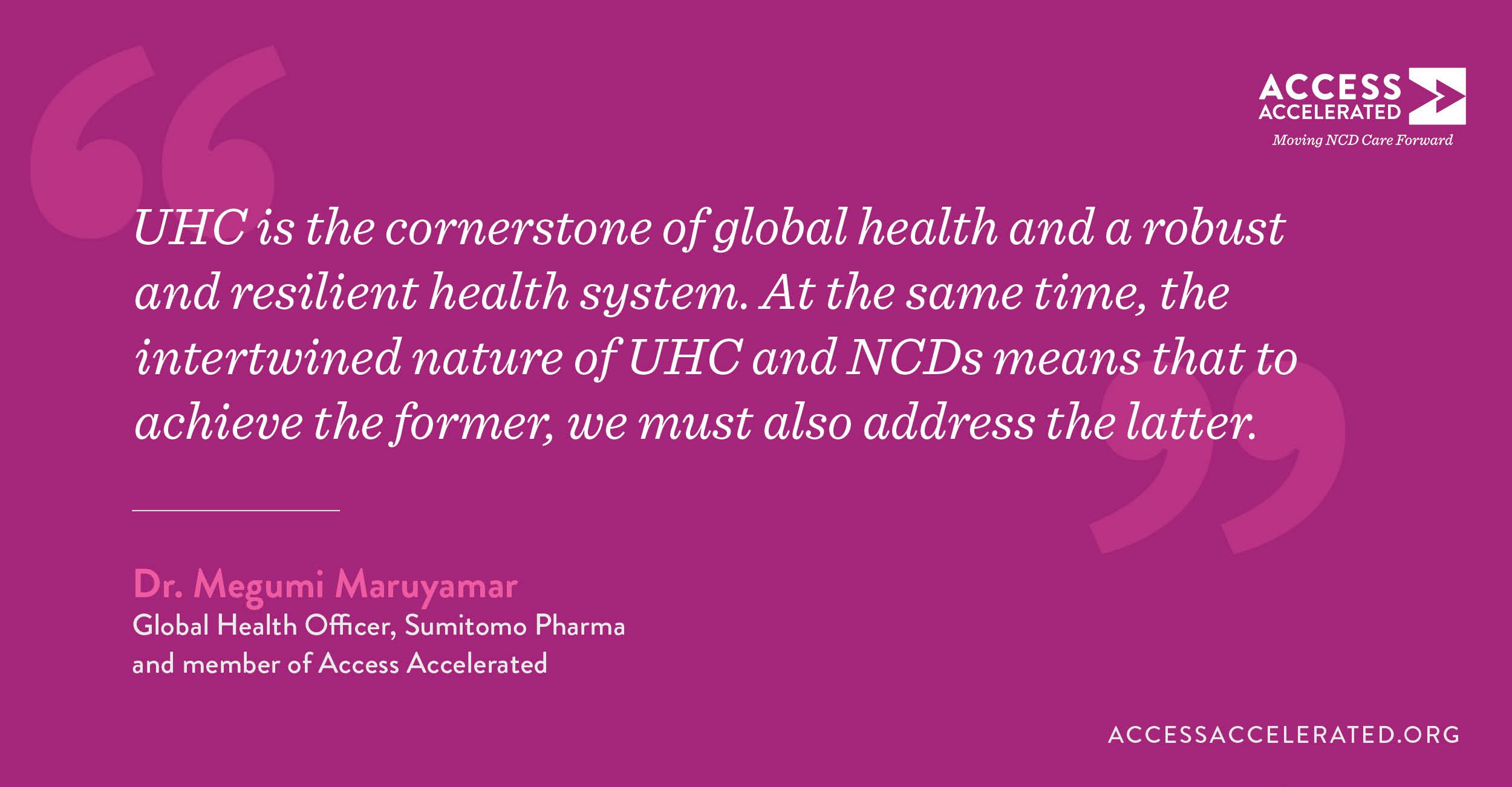By Dr. Megumi Maruyama, Global Health Officer, Sumitomo Pharma and member of Access Accelerated
This week, global leaders will gather for the Group of Seven Summit in Hiroshima, where they will exchange ideas and coordinate on a wide range of issues that will shape our future, from climate change to artificial intelligence.
In January, Japan’s Prime Minister stated in his article of Lancet that universal health coverage (UHC) was “central to the Japanese Government’s vision for the Summit.”[1] To that end, in conjunction with the Hiroshima Summit, G7 Health Ministers will come together in Nagasaki to discuss three major topics: global health architecture for public health emergencies, health innovation, and UHC.[2] The ministerial meeting serves as a powerful declaration of the essential role that UHC plays in human security, and will set the stage for future discussions. As this is the midway point for the implementation of the UN Sustainable Development Goals, there are high expectations for progress in these discussions on the health agenda.
Addressing UHC through strengthening the NCD response
UHC is the cornerstone of global health and a robust and resilient health system. At the same time, the intertwined nature of UHC and noncommunicable diseases (NCDs) means that to achieve the former, we must also address the latter.
That’s why Access Accelerated and its partners facilitated an important dialogue on UHC and the NCD response this past December, identifying several opportunities for prioritized action. Below, I highlight three key points from these conversations that I believe must inform how we tackle this complex issue going forward.
1. UHC is only possible with an integrated, collective approach to responding to NCDs
To make substantial progress towards UHC, G7 nations must address the need for a coordinated and sustained effort to confront the rising NCD burden. The traditional approach to public health and NCDs has often led to siloed and disease-focused programming, which results in fragmentation, low visibility, duplicated and costly efforts, and a lack of long-term thinking. This ultimately undermines a health system rather than strengthening it.
To reduce the cost of duplicated efforts, we need a stronger integrated approach to delivering equitable access to care and coordinated action through multi-sectoral partnerships. Political commitment from both health and finance ministers is essential to ensuring adequate domestic funding, while greater cooperation between NCD and UHC stakeholders is a key to building stronger health systems.

2. NCDs demand considerable and sustainable investment
While more governments are recognizing the significant and growing impact of NCDs on health, economic prosperity, productivity, and growth, this appears to have done little to increase domestic funding, which continues to be a barrier to a strengthened NCD response, hindering progress towards UHC. While some countries are making headway in terms of service coverage, less progress is being made on financial coverage.
G7 countries, as major global economic forces, must take the lead in mobilizing resources and advocating for increased investment in UHC. Investment in NCDs arguably offers the best return on investment for a government from the perspective of boosting productivity and reducing health costs. There is a need to include these proven interventions as part of UHC, while also looking for opportunities that leverage additional sources of funding and investment, including public-private partnerships, to further expand NCD service and financial coverage.
3. Progress is realistic and attainable
Many LMICs, including Ghana and Vietnam, have made excellent progress towards UHC even during the pandemic era. Their successes can be attributed to strong political commitment, efficient allocation of resources, and the development of innovative and context-specific health financing mechanisms. These countries’ progress highlights the potential for significant improvements in health outcomes and equity, even when resources are limited or priorities are changed.
Turning the tide
G7 nations have a pivotal role to play in advancing UHC and addressing the growing burden of NCDs. By promoting substantial and sustainable investment, adopting an integrated and collaborative approach, and building resilient health systems, they can make a tangible difference in global health and economic prosperity. As global leaders convene in Hiroshima, it is crucial that we seize this opportunity to drive progress for all nations.
[1] https://www.mhlw.go.jp/content/10501000/001041645.pdf
[2] https://www.mhlw.go.jp/stf/seisakunitsuite/bunya/hokabunya/kokusai/g8/g7health2023_en.html